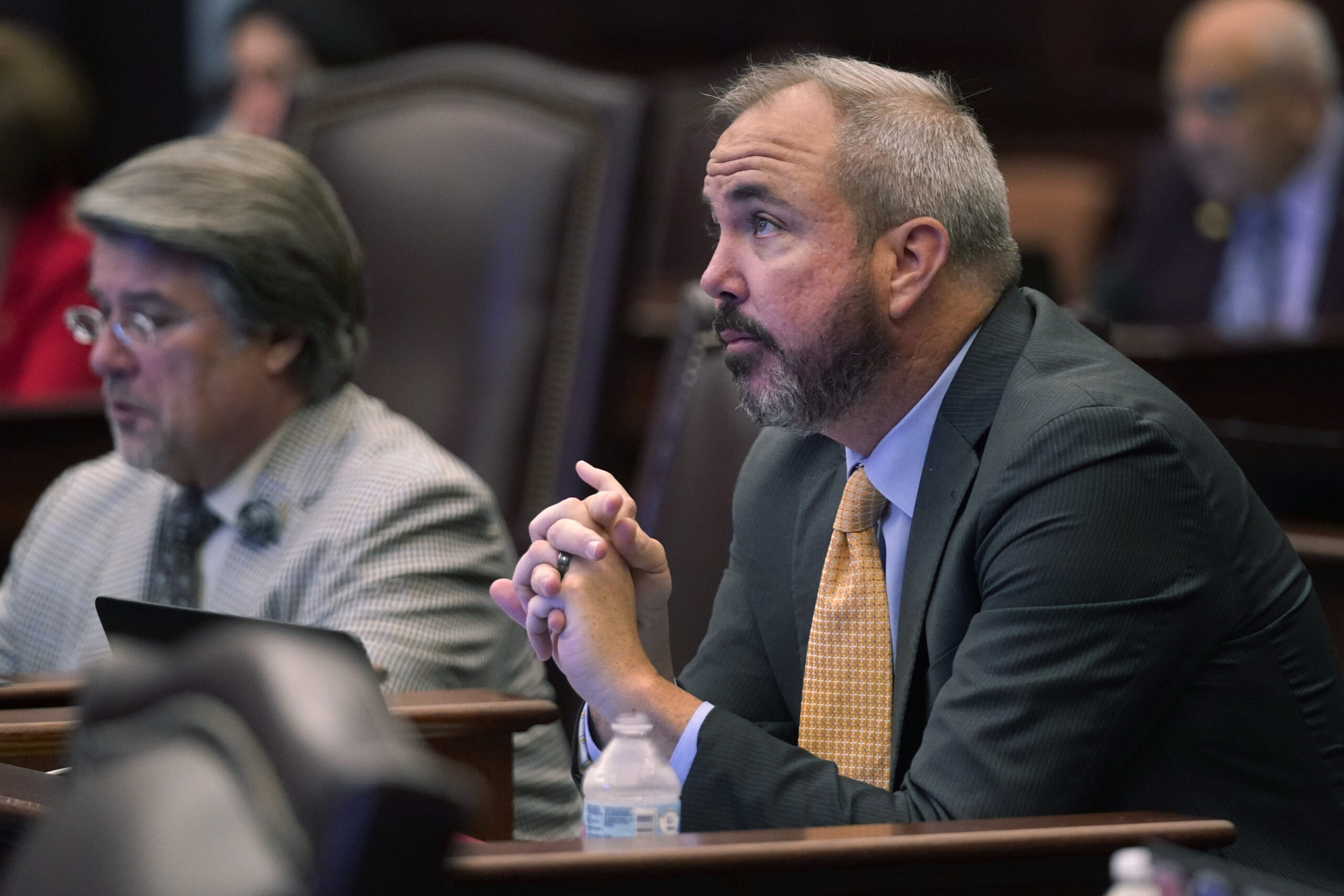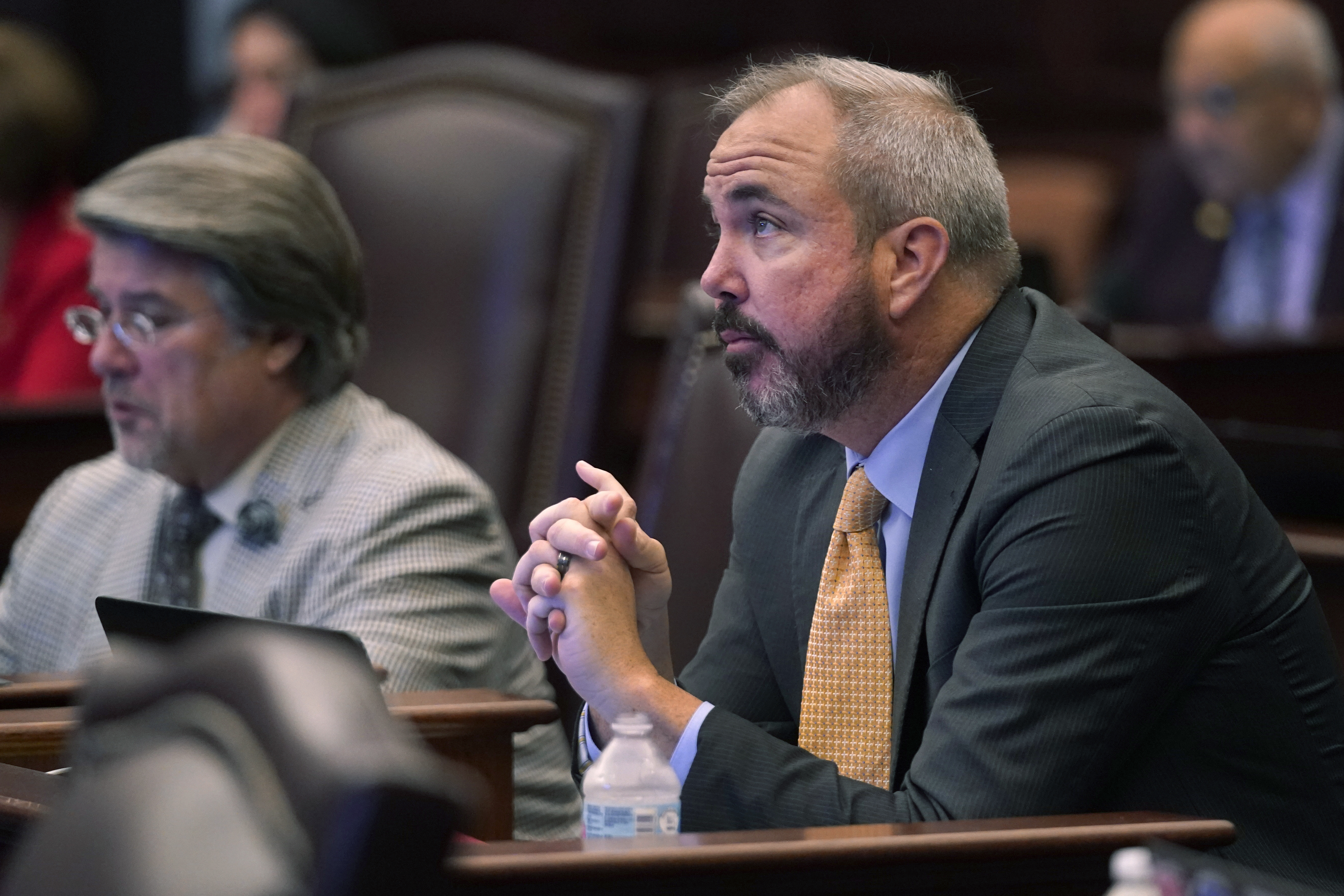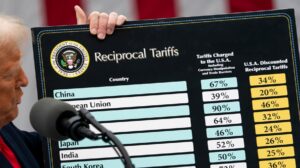Congress
Trump threatens veto of bill to curb tariff power
The Trump administration is threatening to veto a bipartisan Senate bill to give Congress the ability to review new tariffs, protecting President Donald Trump’s claim of unfettered power in the early stages of a trade war that is sinking financial markets.
Trump’s veto threat comes as a handful of Senate Republicans have signed onto a bill from Sens. Maria Cantwell (D-Wash.) and Chuck Grassley (R-Iowa) that would require the president to notify Congress within 48 hours of issuing any new tariffs and that Congress explicitly approve any tariffs within 60 days. The bill also would allow Congress to end any tariff at any time.
The White House — in a statement of administration policy sent to congressional offices Monday — argued that the bill would “severely constrain” Trump’s tariff powers and “eliminates” Trump’s ability to have leverage over foreign countries.
“If passed, this bill would dangerously hamper the president’s authority and duty to determine our foreign policy and protect our national security,” the White House added in the statement reviewed by Blue Light News, warning that if the bill makes it to Trump’s desk “he would veto the bill.”
The bill faces an uphill climb to Trump’s desk. Senate GOP leadership hasn’t backed it yet and has not committed to allowing it on the floor. And while GOP Rep. Don Bacon (R-Neb.) is introducing the bill in the House, Speaker Mike Johnson is publicly sticking by Trump’s tariff strategy.
Congress
This is Fine: Florida sends a bare-knuckle brawler to Congress

Congress has seen plenty of firebrands and confrontational lawmakers — especially from Florida. But Washington still might be in for a shock when it comes to Randy Fine.
Over his nine years in the Florida Legislature, he gained a reputation for his bare-knuckle style of politics and spats with local officials. Now the former gambling executive will be going national with last week’s special election win in a deep-red district on Florida’s northeast coast.
Three years ago, Fine called a school-board member a “whore” in a text. During Covid, he got sanctioned by Facebook after he wrote a post alerting constituents to a school-board meeting on masking that included the school-board member’s phone number. A judge sent Fine to anger management after pictures surfaced that appeared to show him giving the middle finger during a virtual hearing. (He insisted he was scratching his forehead.)
He recently became irritated with a pro-Palestinian activist who was testifying at a hearing and dismissed the man with, “Enjoy your terrorist rag.” When people began to protest, he threatened to empty the room.
“I’m the chairman, I can say what I want,” he said. “If you don’t like it, you can leave.”
And most eye-popping of all, he’s been a frequent foil of Gov. Ron DeSantis ever since he swapped his 2024 presidential endorsement from the governor to Donald Trump, even topping it with a scathing Washington Times op-ed that accused the governor of not doing enough to fight antisemitism in Florida in the wake of the Israel-Hamas war.
Though it’s been more than a year since that fallout, DeSantis has made it clear all is not forgiven. “He repels people,” DeSantis said about Fine in the middle of a 10-minute rant after the election. He then dumped on Fine as someone who had underperformed in the race and argued he was only able to pull off a 14-point victory after the president helped “bail him out in the end.”
Fine’s response: To needle DeSantis over how he has less than two years left in office, with no clear path for where his political career is headed next. “A dying star burns hottest before it fades into oblivion,” Fine wrote on X before taking that same message into his first national interview with FOX Business Network’s “Mornings with Maria.”
Fine has some enemies. But to his allies, his personal style makes him a good lawmaker. “The guy is destined for stardom,” said Florida state Sen. Joe Gruters, another GOP DeSantis antagonist who was Fine’s roommate when they served in the Legislature and is his closest friend. He praised Fine’s “ability to throw the hardest right hook in the business.”
“Somebody punches him, he throws the biggest haymaker that’s around at his opponents,” Gruters said, “and that goes for Republicans and Democrats.”
The ordeal between DeSantis and Fine has been a dramatic U-turn. Fine was once DeSantis’ Jewish outreach chair. He even introduced or co-sponsored many of the policies DeSantis became known for nationally, including measures to limit race-related trainings in classrooms and to punish businesses that allow minors into “adult live performances” — seen by many as targeting drag shows. He was also a key player in the law to give parents more say about what happens in schools, the bill critics like Walt Disney World dubbed the “Don’t Say Gay” law.
And when Disney protested, Fine introduced legislation that aimed to dissolve the theme park’s special tax district. He rejoiced after the feud ended, saying he couldn’t wait to once again enjoy Disney’s cruises and parks with his family.
Chris Sprowls, the former speaker of the Florida House, said he often turned to Fine to ask him to do “really difficult things,” in part because he thought he was smart and could articulate the policy in ways people could easily understand, but also because he could get up and debate against anyone.
“He’s the guy who wants the ball,” Sprowls said. “Every coach wants the guy who wants the ball, and Randy wants the ball for people all the time.”
Gruters agreed. “If you want a bill to pass in the Legislature, the first guy I always recommend is Randy Fine, because he will beat the crap out of his colleagues to try to make sure that that bill passes,” he said. “There’s nobody with the personality and the willingness to get in the mud and make things happen like Randy Fine.”

Nicknamed the “Hebrew Hammer” by Gruters — a title he embraces — Fine was the only Jewish Republican for most of his time in state government.
He has said a key reason he’s in politics is to support pro-Israel causes. But he has also lashed out against Muslims, referring to Josh Weil, his Democratic opponent in the special election who is a convert to Islam, as “Jihad Josh.”
The Florida chapter of the Council on American-Islamic Relations has called for Fine to be censured, including for comments he made on social media saying, “Gaza must be destroyed.” Fine also posted on X that Democratic Reps. Rashida Tlaib of Michigan and Ilhan Omar of Minnesota “might consider leaving before I get there. #BombsAway.”
But the Republican Jewish Coalition endorsed Fine early in his campaign, and his allies defend him as someone passionate about pro-Israel causes and fighting antisemitism.
“He is unapologetic about fighting for Israel,” said Sprowls, who joined Trump and Fine on a trade mission to Israel. He pointed to Hamas’ acts of terrorism and said of Fine: “He’s not going to equivocate on these issues. He’s going to be strong, and I think that is really important to have members like Randy who can fight for the moral imperative that is protecting Israel and their right to live and thrive in the Middle East.”
Trump endorsed Fine over Truth Social before he got into the race and later called him a “tremendous Voice for MAGA.” The race ended up tighter than expected in the closing weeks, with Fine’s opponent polling close to him and estimating he raised $14 million.
Fine was thought to be a shoo-in for the seat previously held by Trump’s national security adviser, Mike Waltz, who has been in hot water recently over accidentally adding The Atlantic’s editor in chief to a messaging group with other top officials. (In an ironic twist, the seat is also the one DeSantis held when he was in Congress.)
Fine said in an interview that he had been interested in going to Congress “when I was a kid.” But when he worked for a congressman one summer, the representative told him, “Don’t do this job until you know how you’ll pay your mortgage. Don’t be like me.” So Fine became a gambling executive whose millions allowed him to mostly retire by age 40. (His state financial disclosure counts his net worth at just over $30 million.)
He didn’t think politics was in his future at that point, but then, he said, “I got mad about my kid’s school.” His son was in first grade and he told the school he didn’t like how they were teaching common core math.
“I got told I wasn’t qualified to have an opinion about it, because I don’t have a degree in academic administration. And look, my degrees from Harvard aren’t worth that much, but I ought to be able to handle first-grade math,” he said, referring to his undergraduate and business graduate degrees from the storied Ivy League school. “We got upset, and so I decided I would go and fix it. And I did: We got out of common core math then I helped pass a law that said you can’t tell a parent they’re not qualified to have an opinion about their kids’ education.”
In January, the Legislature had its first big standoff with DeSantis over illegal immigration, after years of complying to his demands. After a state Senate floor session, many Republicans in the Legislature scattered to avoid talking to any reporters about the tension with the governor. But Fine came out of the chamber ready to discuss what had just gone down and why the Legislature disagreed with the governor’s proposals.
Looking toward the group of journalists, a senior Democratic aide who has described Fine as a “mean-spirited asshole” leaned over to a reporter and whispered, “I disagree with him on almost every issue, but he is very good at what he does.”
Most Democrats in Florida agree with DeSantis on Fine, with state Democratic Party Chair Nikki Fried calling him an “asshole” as well as a “bad politician and a bad person.”
“For the first time in almost six years,” she said, “I agree with Ron DeSantis.”
Jennifer Jenkins, the former school-board member Fine insulted, called him a “piece of shit” and a “bully.” The two have fought over mask mandates and LGBTQ+ policies in schools. Fine also raged at a city councilmember in a text over the fact that county police had invited Jenkins and not him to an event, saying it would jeopardize funding for the Special Olympics and the county, texts obtained by Florida Today showed.
“Randy Fine’s behavior speaks for itself,” Jenkins said. “He is divisive, disrespectful, and entirely untrustworthy. He’s not a leader, he’s a cautionary tale that Florida is about to serve up to the rest of the country on what happens when you let a clown hold office.”
When asked about what his style in Congress would be, Fine said it took him a couple of years to break out in the Legislature. In Congress, he said, it’ll be similar because he’ll be so new and will still have to learn the process and learn from others.
Pressed about it, he said: “I do think that my style will work well in Washington. I mean, I’m an aggressive guy.”
Congress
Democrats question former DOJ officials about Trump administration dealings
Former Justice Department officials addressed Congressional Democrats Monday about the Department of Justice’s alleged closed-door dealings in a so-called shadow hearing — one of the few avenues for conducting oversight of the Trump administration afforded to the minority party in a Republican governing trifecta.
Democrats on the House and Senate Judiciary Committees pressed former DOJ pardon attorney Liz Oyer, who was fired from the department, and former federal prosecutor Ryan Crosswell, who resigned in wake of the agency’s decision to drop its corruption charges against New York City Mayor Eric Adams, about the circumstances of their departures.
Both witnesses appeared willingly before the Democratic lawmakers who, without control of the House or Senate, lack the ability to call official hearings and subpoena uncooperative witnesses.
California Democratic Sen. Adam Schiff, who led the hearing with House Judiciary ranking member Jamie Raskin (D-Md.), said Democrats had pleaded with congressional Republicans to hold oversight hearings around the Trump administration’s actions, but their colleagues had “abdicated that important responsibility.”
“Trump is taking unprecedented steps to bend our justice system to his will,” said Schiff in his opening remarks, adding that congressional Republicans “have stood by as the President has run roughshod over the legislative branch and turned Congress into a little more than a rubber stamp.”
A shadow hearing, as its often called, is a frequent tool for House lawmakers in the minority to hold public meetings around issues that the majority party will not. It’s less often deployed in the Senate. But the bicameral event was unusual in bringing together about 14 lawmakers from across the Capitol for a hearing led by one of the Senate’s most junior Democrats. Schiff, who served in the House prior to his election to the Senate last November, sat beside the top Democrat on the Senate Judiciary Committee, Dick Durbin of Illinois.
Oyer, the former pardon attorney, testified that she had been fired after refusing to cooperate with the administration’s efforts to restore the gun rights of actor Mel Gibson, who is also a supporter of President Donald Trump. She claimed that ahead of her appearance before lawmakers Monday, the Justice Department moved to silence her, sending a letter urging her not to share confidential department information. To deliver the letter, DOJ intended to send U.S. marshals to her home Friday night while her teenage son was there alone, but once Oyer confirmed receipt of the letter via email, the in-person delivery was called off, she added.
A Justice Department spokesperson did not immediately respond to a request for comment.
Crosswell, the former federal prosecutor, recalled how attorneys in his division of DOJ were asked to sign a motion to help drop the charges against Adams, after a number of other officials had resigned in refusing to cooperate. The alumnus of the DOJ’s public integrity section ultimately chose to resign his post too, he said.
In addition to Oyer and Crosswell, the witnesses included Rachel Cohen, a former Big Law associate who called on her firm to refuse to cooperate with the administration, and Stacey Young, the founder of a support network for DOJ alumni launched at the start of the second Trump administration.
Congress
Trump’s trade chief will defend tariffs as a ‘drastic, overdue change’
President Donald Trump’s tariff “strategy is already bearing fruit,” U.S. Trade Representative Jamieson Greer plans to tell Congress on Tuesday, pointing specifically to three countries that he said have offered trade concessions after being threatened with higher U.S. duties.
“Nearly 50 countries have approached me to discuss the president’s new policy and explore how to achieve reciprocity,” Greer says in prepared testimony obtained by POLITICO. “Several of these countries, such as Argentina, Vietnam and Israel, have suggested they will reduce their tariffs and non-tariff barriers.”
“These obviously are welcome moves,” Greer continues, while also citing recent auto industry plans to employ more American workers “Our large and persistent trade deficit has been over 30 years in the making, and it will not be resolved overnight, but all of this is in the right direction.”
Greer will testify Tuesday before the Senate Finance Committee, and Wednesday before House Ways and Means. The annual hearings on the president’s trade agenda are attracting increased attention this year following Trump’s decision last week to impose a baseline tariff of 10 percent on nearly all imports and tariffs ranging up to 50 percent on 60 trading partners that have the biggest trade surpluses with the U.S., which the Trump administration argues is a sign of unfair trade relations.
Trump’s tariff action has triggered a major financial market selloff and increased the risk of a recession, due to increased costs of imports and lost export sales as countries, such as China, retaliate against American goods. In addition, Trump and members of his administration have sent mixed signals about whether the tariffs are here to stay or can be negotiated away in exchange for other countries reducing their own barriers.
Greer, in his prepared remarks, defends Trump’s action, which he describes as “the most significant in change in U.S. trade policy since we allowed China to joined the World Trade Organization” in 2001. He blamed that “disastrous decision” and others like it for the loss of 5 million manufacturing jobs and 90,000 factories since 1994, although advances in technology and increased mechanization are also responsible for some of the job losses.
He also outlines a vision of where Trump wants to lead the economy, despite warnings that higher tariffs will increase prices for consumers and make American companies less competitive in international market as well as strain relations with the rest of the world.
“We must move away from an economy based solely on the financial sector and government spending and we must become an economy based on producing real goods and services,” Greer says. “This adjustment may be challenging at times. It is a moment of drastic, overdue change, but I am confident the American people will rise to the occasion as they have done before.”
-

 The Josh Fourrier Show5 months ago
The Josh Fourrier Show5 months agoDOOMSDAY: Trump won, now what?
-
Uncategorized5 months ago
Bob Good to step down as Freedom Caucus chair this week
-
Uncategorized5 months ago
Johnson plans to bring House GOP short-term spending measure to House floor Wednesday
-

 Politics5 months ago
Politics5 months agoWhat 7 political experts will be watching at Tuesday’s debate
-
Economy5 months ago
Fed moves to protect weakening job market with bold rate cut
-
Economy5 months ago
It’s still the economy: What TV ads tell us about each campaign’s closing message
-

 Politics5 months ago
Politics5 months agoHow Republicans could foil Harris’ Supreme Court plans if she’s elected
-

 Politics5 months ago
Politics5 months agoRFK Jr.’s bid to take himself off swing state ballots may scramble mail-in voting







